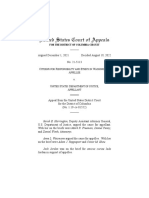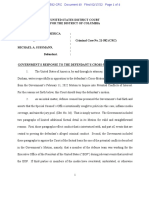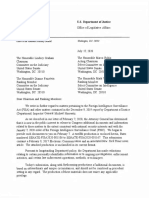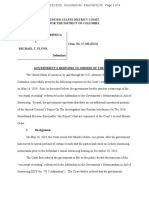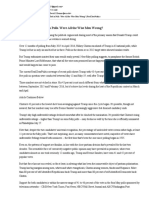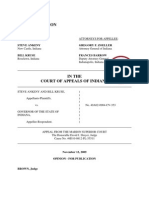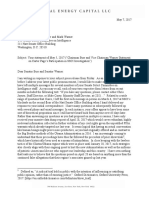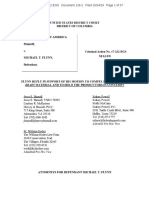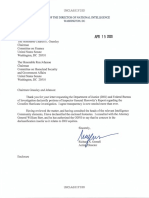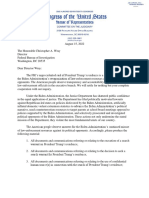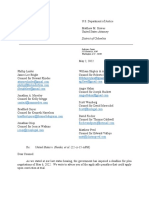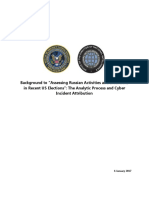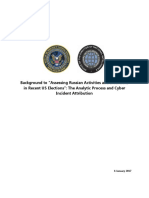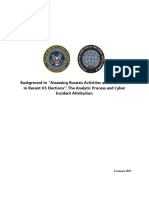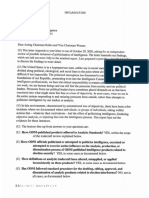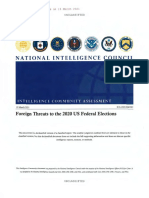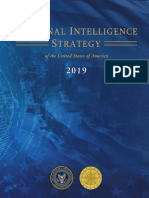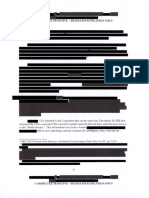0 ratings0% found this document useful (0 votes)
77K views46 pagesHpsci Report 2
The document is an oversight investigation into the Intelligence Community Assessment (ICA) regarding Russian influence on the 2016 US Presidential Election, highlighting concerns about the reliability of certain judgments made in the ICA. While most judgments on Russia's election activities were found credible, significant tradecraft failures were identified in the assessment of Putin's intentions, particularly regarding claims of his preference for candidate Trump. The investigation concluded that the ICA did not adhere to established analytic standards, leading to questionable interpretations of ambiguous intelligence sources.
Uploaded by
The Post MillennialCopyright
© © All Rights Reserved
We take content rights seriously. If you suspect this is your content, claim it here.
Available Formats
Download as PDF or read online on Scribd
0 ratings0% found this document useful (0 votes)
77K views46 pagesHpsci Report 2
The document is an oversight investigation into the Intelligence Community Assessment (ICA) regarding Russian influence on the 2016 US Presidential Election, highlighting concerns about the reliability of certain judgments made in the ICA. While most judgments on Russia's election activities were found credible, significant tradecraft failures were identified in the assessment of Putin's intentions, particularly regarding claims of his preference for candidate Trump. The investigation concluded that the ICA did not adhere to established analytic standards, leading to questionable interpretations of ambiguous intelligence sources.
Uploaded by
The Post MillennialCopyright
© © All Rights Reserved
We take content rights seriously. If you suspect this is your content, claim it here.
Available Formats
Download as PDF or read online on Scribd
You are on page 1/ 46
APPROVED FOR RELEASE BY THE DNI ON 22 JULY 2025
Oversight Investigation & Referral
18 September 2020
The Intelligence Community Assessment (ICA)
“Russia's Influence Campaign Targeting the 2016 US Presidential Election”
Why This Stuoy?
The conclusions ofthe intelligence
‘Community Assessinent (ICA),
“Russian Influence Compaign
Targeting the 2016 US Presidential
Election,” raised concerns about
Russian attempts to undermine
‘confidence in the US election system,
prompting a comprehensive
examination of the ICA's analysis
Investigators compared the ICA
analyte tredecraft against the
standards prescribed in intelligence
Community Directive (ICD) 203,
“Analytic Standards,” the primary
guiding document for evaluation of
analytic products for the Intelligence
Community (IC) Investigators spent
‘over 2,300 hours reviewing the ICA
and its source reports, mostly at CIA
Headquarters in the compartmented
‘eports vault, and on outside related
research. In addition, 20 interviews
were conducted of intelligence
officers or FBl agents who were
associated with managing or drafting
the ICA or the production of raw
a5 ICA sources.
2. Improve peer review of
controversial assessments involving
limited-access intelligence
2. Require political appointees to
recuse themselves from managing
such assessments during a
presidential transition,
3. Mandate that finished analysis,
citing substandard raw intelligence
reports include a context footnote
explaining all factors that reduce
confidence in the information.
Most ICA judgments on Russia's activities in the US
election employed proper analytic tradecraft and were
consistent with observed Russian behavior. The key
judgments found to be credible include: 1) President Putin
ordered conventional and cyber influence operations,
notably by leaking politically sensitive emails obtained from
computer intrusions; 2} Putin’s principal motivations in these
operations were to undermine faith in the US democratic
process and to weaken what the Russians considered to be
aan Inevitable Climon presidency; and 3) Putin held back
leaking some compromising material for post-election use
against the expected Clinton administration,
In contrast to the rest of the ICA, the judgment that Putin
developed “s clear preference” for candidate Trump and
“aspired to help his chances of victory” did not adhere to the
tenets of the ICD, Analytic Standards:
©. The Director of CIA (OCIA) ordered the post-
election publication of 15 reports containing.
previously collected but unpublished intelligence,
‘three of which were substandard—containing
information that was unclear, of uncertain origin,
potentially biased, or implausible—and those
became foundational sources for the ICA judgments
‘that Putin preferred Trump aver Clinton. The ICA.
misrepresented these reports as reliable, without
‘mentioning their significant underlying flaws.
° One scant, unclear, and unverifiable fragment of
a sentence from ane ofthe substandard reports
constitutes the only lasified information cited to
suggest Putin “aspired” to help Trump win
* The ICA gnared or selectively quoted reliable
inteligence reports tht challenged—and in some
cates undermined-—judgments that Putin sought to
elect Trump
© The ICA failed to consider plausible alternative
explanations of Putin's intentions indicated by
reliable intelligence and observed Russian actions
> CIA picked five CIA analysts to write the ICA,
and rushed its production in order to publish two
weeks before President-elect Trump was sworn-in.
Hurried coordination and limited access to the draft
‘reduced opportunities for the IC to discover
rmisquoting of sources and other tradecraft errors.
DETAILED FINDINGS
‘This is the unredacted, fully-sourced, limited-
‘access investigation report that was drafted and
stored in a limited-access vault at CLA
Headquarters.
* «Although the principal findings of this
report are identical to the Too Secret
downgraded version prepared for
members of Congress, this version
‘contains significantly more detailed
‘quotations from sensitive reports—to
Include source descriptions from raw
intelligence—and extensive footnotes
citing raw intelligence reports and
interviews of IC officers.
© ., The names of IC officers quoted in the
main text were omitted by prior
agreement with the agencies, but are
available in the footnotes of the original
sourced copy,
* Fineling #2: The Bulk of ICA Judgments
Russia's Election Operations Ware Sound and
Employed Proper Analytic Tredecraft
‘The majority found most ICA judgments on
Russia's election activities to be well reasoned,
consistent with observed Russian actions,
properly documented, and~particularly on the
cyber intrusion sections—employed appropriate
caveats on sources and identified assumptions.
The key ICA judgments that the Majority found
credible are summarized below:
‘® Russian efforts to influence the 2016
US presidential election represent the
most recent expression of Moscow's
longstanding desire to undermine the US
lipersi democratic order.
© Russian intelligence services, acting
on the orders of Russian President
ihe ONI describes inteligence Cammunity Directive
(C0) 203 Anolytic Standards as the document that
Vladimir Putin, launched conventional
and cyber influence operations—notably
by leaking politically sensitive emails
obtained from computer intrusions
during the 2016 election.
° Putin's principal motivations in these
infiuence operations were to advance
‘Moscow’s longstanding desire to
undermine faith in US democracy, and to
weaken from the start what the Russians
considered to be an inevitable Clinton
presidency a
° Putin held back leaking some
compromising material to use against the
expected Clinton Administration after
they took office.
The operations officers at CIA and NSA who
produced the raw intelligence cited in the ICA
showed great professionalism.
© ClACollection Management Officers
(CMOs) in particular, did an excellent job
of employing detailed context statements
that spelled-out evidentiary problems
affecting the reliability of raw
Intelligence.
© Thedrafters of ICA did not accurately
cite the most critical context statements
(addressed in detail later inthis study)
but the original raw reports were
gonetheless professionally prepared Mall
Finding #2: Significant Tredecraft Fallings
Cast Doubt on ICA Judgmants of Putin's
Intentions
In contrast to the ICA’s other Judgments, the
sections addressing Putin's intentions for
influencing the US election did not observe
professional criteria set forth in ICD 203, Analytic
Standards
“establishes the Intelligence Community (IC) analytic
standards that govern the production and evaluation
7
‘These failures were serious enough to
call into question judgments that allege
Putin “developed 2 clear preference for
candidate Trump” and “aspired to help
his chances of victory” and that “Aussi
leaders never entirely abandoned hope
for a defeat of Secretary Clinton aa
' “The ICA defined these as “high
confidence” judgments based on a “body
of reporting from multiple sources” (see
box “Putin's intentions) a
What the ICA Says: Putin's Intentions,
*Wefurtherassess Putinand the |
Russian goverment developed a clear
preference for [candidate Truma). We
have high confidence in these judgments”
(emphasis added). cap 8. coup. af
“CIA and FB! also assess with high
confidence that Putin and the Russian
Government aspired to help feancidate
Trump's} chances of victory when possible
by discrediting Secretary Clinton
(emphasis added). pap 3 casei)
“"\e assess thot Russian leaders never
entirely abandoned hope for a defeat of
Secretary Clinton." “When it appeared
Secretary Clinton was likely to wvin the
election, the Russian influence campaign
began to focus more on undermining her
future presidency.” ica page? fea
‘The ICA judgments on Putin's intentions failed
‘to adhere to the following analytic standards
‘within ICD 203:
“Property describe quality and
credibility of underlying sources."
“Properly express and explain
uncertainties associated with major
analytic judgments.
of analyte products; articulates the responsibility of
intelligence analyst to strive for excellence, integrity,
and rigor in their analytic thinking and work practices.”
© Base confidence assessments on “the
quantity and quality of source
material,
2 "Be informed by all relevant
information available."
> "Consider alternative perspectives
and contrary information ‘i
® "Be independent of political
considerations.
Despite the ICA’s significant tradecraft
failures, the assessment demonstrated
awareness of the ICD standards In a section
describing analytic proce
2 “These standards include describing
sources (including their rellabiity and
access to information), clearly exoressing
uncertainty, distinguishing between
underlying information and analysts’
judgments and assumptions, exploring
alternatives .."
© Acritical part of the analyst's task is
to explain uncertainties associated with
‘major judgments based on the quantity
‘and quality of the source materia!
(emphasis added)
Unlike routine IC analysis, the ICA wasa high-
profile praduct ordered by the President,
directed by senior IC agency heads, and created
by just five CIA analysts, using one principal
drafter. Production of the ICA was subject to
‘unusual directives from the President and senior
political appointees, and particularly OCIA. The
draft was not properly coordinated within CIA or
the IC, ensuring it would be published without
significant challenges to its conclusions,
‘The tradecraft failures identified in this
review are limited to sections of the ICA
addressing Putin's intentions only. Because the
ICA did not follow standard procedures for
2
drafting or coordination within CIA and the IC,
they should not be seen as an indication of
systemic prablems with analysis from C1A, NSA or
Fail
Finding #3: The ICA Falled to Acknowiadzs
‘That Key Judgments on Putin's intentions Were
Based on Raw Intelligence That Dig Not Meet
‘Tradecraft Standards
ICD 203 instructs that inteligence tradecraft
“properly describes quality and crediblity of
underlying sources” to include factors affecting
the reliability oftheir information, such as
“source access, motivation, possible bias or
‘deception, and accuracy and completeness”
(emphasis added). Accurate citation of raw
intelligence reporting is critical to explaining to
the reader the reliability of the evidence used to
drive judgments, yet the ICA disregarded these
fundamentals in sections that claimed Putin
intended for Trump to win A
Key classified reports, cited by the ICA In
‘support of judgments that Putin developed “a
lear preference” for candidate Trump ang
“aspired to help his chances of victory” contained
‘iaws in terms of clarity or reliability. The ICA
omitted or obscured such information from
context statements—that the CIA's Directorate of
Operations had properly added to raw human
source intelligence (HUMINT) reports—thus
felling to warn the reader of significant flaws in
the quality or creaibility of foundational
sources.
3 MMIII C18 officers ais said that DCIA personally
2
‘strongly preferred Republicans" does
vat pete a MCE Tee
© EEE 00.
Seen rcar ne
“Kremlin had found it easier to reach
agreements with US Presidents from the
Republican Party” and that this was
because Republicans were “iess
concerned with issues that were
Unpleasant for Russia such as democracy
and human rights.”
9 I 104 cd not
Take the bastcanalvlestep, however, of
comparing the plausibility of the
unknown subsouree aims tothe
documented policies of the past three
Republican Presidents al of whom
featured democracy and human rights 28
cornerstones of tel forelgn pales. f
brings o mind President Reagan's
famous quote, “Mr. Gorbachev tear
down this wall” or President George W.
Bush's comments on “the als of el.”
© The information does not appear to
make sense in the historical context,
further raising the question of the
reliability of the unknown subsource.
By both obscuring that the reporting is from
‘an unknown source with unknown access and
that the information does not make sense, the
ICA leaves the reader unaware of the weakness
of the evidence cited to support the major
judgment on Putin's intentions.
Reaot's Unknovs Even part of the ICA's
own classified text—based on reliable
reporting—contradicts the information contained
in the third substandard report, This raised
further questions about why, contrary to ICD 203
criteria, the third report was cited as evidence of
Putin's intentions without further explanation
[Some sentor Russian
officials worried a Trump administration woula
bring hardline I security advisers or that a
Republican controlled Congress would not
support measures that would be beneficial to
\ 5,
‘cautioned about the risks to Russia of a
Republican Administration, noting that
“those who would hold positions in la
lnistration should he win will
likely adhere to conservative anti-Russian
positions.”
MEE cfr, cots the
historical record and source materials for the
ICA's "annex 0: Historical Patterns of Russian
Influence In US Elections’ indicate thet the A
“strongly preferred Republicans” judgment
glossed over details in the Annex—from reliable
fources—that contradict the claims from the
unknown source on Russia's historical preference
for Republicans
© MIB “there are no [Russian] plans to
target any Democratic presidential
candidate for active measures because
any Democratic candidate is preferable
to Prasident Reagan’,
‘© | Despite unknown sourcing, reliable
contrary evidence, and implausible
claims, the then Director of National
Inteligence, James Clapper, responding
to 2 request to double check the sourcing
behind the judgment, responded ina
letter to the Committee that he
nonetheless endorsed the ICA Judgment
(see box “DNI").
DNI Clapper Comments on ICA Citation of
the Third Report
“I have reviewed the underlying source
‘material myself and entirely concur in the
judgment of the analysts, which | believe is
consistent with standards of analytical
tradecraft and objectivity.” [tener to Hrs, 32
sama 2027)
The Ca Faisely Claimed he
2 Report Wi orore:
v of ing. The ICA text is
misleadingly drafted to suggest that some of the
Qualities of candidate Trump aligned with Putin's
preferences for international partners, citing the
‘third substandard report as evidence for the ICA
judgment that "Putin developed a clear
preference” for candidate Trump.
2 | The ICA further claimed information
from the third report was corroborated
by liaison, diplomatic, and press
reporting, as well as sensitive signals
intelligence (SIGINT).
©. Butin following-up every citation,
none were found to corroborate the ICA
claims.
MEE The (C4 also used the
third substandard report to claim that members
(of Putin's “inner circle” had compared Trump to
other leaders with “business interests" that Putin
could work with, using this a part of the
Supporting evidence for the judgment that Putin
“aspired” to help Trump win.
© NT The cites isison
reporting didn’t mention Trump at all,
and was from 2014, before Trump was a
sandidatell
© IIS The cited SiGiNT
also didn’t mention Trump, and was
© IIE The cited diplomatic report isa
postelection overview of Moscow from
the US Ambassador that references @
media opinion item by a Russian pundit
suggesting that Trump anc Putin should
“work together ike businessmen" which
ishardly a corroboration of Putin's “inner
circle” preferring Republicans or
susinesemen ill
1
© MME ronically, he same Embassy
‘cable quotes Deputy Foreign Minister
Ryabkov as saying of Trump's election,
“We do not feel any euphoria’ citing 2
“bipartisan anti-Russian consensus”,
Which directly contradicts the ICA
‘Udement that the Russians preferred
Trump.
Finding #6: The IGA Excluded Significant
Intelligence That Contre icted Its idgrnesre
That Putin Asptrad to Help Trump Win
100 203 also instructs that intelligence
analysts “must perform their functions with
‘objectivity and that judgments "must consider
alternative perspectives and contrary
information.” It further directs that “analysis
informe relevant information
available” (emphasis added),
The ICA selectively omitted quates from key
HUMINT and SIGINT reports that contradicted
the judgments on Putin’s intentions while,
conversely, It included quotes-—from those same
HUMINT and SIGINT reports—that supported the
ICA thesis. This was done multiple times, to
include citations of two foundational sources for
the ICA,
This cherry picking of reports is an important
indicator for evaluating ICA tradecraft, By
selectively quoting a repot repaatediy, the
‘authors both demonstrated their regard for the
value of the source, while simultaneously
providing evidence of disregard for ICD 203
criteria on objectivity and consideration of
contrary information,
The ICA Selectively a
Contradicted Judgi:
Although the ICA quoted the reliable report four
times, it omitted the most critical element of the
report that strongly conflicted with the ICA major
judgments on Putin’s intentions Mii
ated o Key Reco
s on Putin's Inter:
MR ssc fron the ica
was significant intelligence that ia
HB 2 longtime Putin confidant, told a
sensrive contact I that:
° MERE “Putin told him
he did not care who won the election”;
° BR ons
often outlined the weaknesses of both
major candidates.”
9 RII 75 essere
that, In either case, “Russia was
strategically placed to outmaneuver
either one.”
MS 00s orrsivaience
‘about the two candidates is further supported by
EEE —a1s0 omitted from the ICA
}. Putin's
made no positive mention of Trump. Instead, it
revealed his pessimism that neither Trump nor
Clinton would be able to crrect the strained
relationship. although he indicated that there
could be opportunities to gradually improve
relations, he made clear that he didn’t have a
preference for ether candidate,
© RIE Reinforcing his
ambivalence about the twa candidates
Putin was pessimist that ether one
could overcome strong ant-Russian
political sentiment in Washington in the
near term, but seemed wing to work
wither intone Tamg nating a,
there could be room to “yodaaiy id the
bilateral dialogue of irritants,"
MR 1s theme was
echoed by a
iia |
ae
noted thet, "Regardless of who wins the
election, Russia will be able to begin a
2
fresh dialogue with the new
administration” and that “Russia is ina
stronger position than 8 years ago, "ill
. JA Russian|
said
Tiss was lang for con
Crimes cory bora "they knew
where [she] stood and despite media
stories, Russia could work with her”,
code oS 2
“collaborative source with excellent
sceese" but hows raporting had not
been corroborated Mild
A
preoccupation of Russian officals and analysts
was that neither Trump nor Clinton would
respect Russia's strategic interests or treat Russia
as an equal on the world stage, and it would take
years to repair the relations,
ee
: a po
MS wore thar, “regardless of
the party affiliation” of the next
President, the US would "not view Russia
as an equal partner.
0 ics
HIME cautioned, "Russia uncerstands
that t should not labor under the illusion
that relations will get better soon after
the November US Presidential election”
and that is “unlikely [Trump] wil be
able to take stens to correct lations “it
¢ MR oti’: 0p Us
experts echoed that view, noting it would
take vears for Teump or Clinton to fix the
relationship
© The ICA Omisted Reliable Evidence That
Putin's Key Advisers Saw Significant Downsides
to Trump Presidency. The ICA selectively
excluded information from reliable intelligence
sources that senior Russian officials had serious
reservation about how a potential Trump
administration could be bad for Moscow and
complicate repairing relations with Washington.
The significance of that omission becomes
apparent when reading the ICA's judgment of
‘what Russian officials thought, which pushed the
“clear preference for Trump” judgment that was
directly contradicted by the raw reports cited by
the ICA as sources (see box “Russian Views").
What the ICA Says: Russian Views of
Trump
‘To support the judgment, “Putin, his
advisers, and the Russian Government
| developed a clear praference for [Trump] ovar
Secretary Clinton” the ICA stated!
“in late NN prepared an analysis
for Russia's senior-most America experts i
which he said the [Trump's] positive
attributes—such as his perceived
unwillingness to criticize Putin, his
background as a businessman, and the
presence of advisers viewed as positively
Inclined toward Russian interests—
‘outweighed potential negatives such as
(REI 4: 2 sun0 2016 Moscow
conference on US politics, President Putin and
two prominent Russian experts on US politics —
Head of the USA-Canada Institute Sergey Rogov
and Ambassador to Washington Sergey Kislyak—
gave speeches on the implications for Russia of
the US election. The format was an examination
ff the pros and cans of a Trump victory.
(EES 7 (Ca focused on the
“pros” of Russian attitudes towards Trump, while
ignoring the “cons” the Russians worried about in,
‘the event of a Trump victory. The Russian
officials and America experts were thinking hard
about all Implications, including that a Trump win
might keep the House and Senate in Republican
hands, and how that would be bad for Russia,
a
‘By omitting the below evidence, the ICA who won, Moscow expected a prolonged struggle
denied the reader access to significant to repair strained relations with Washington.
telligence that undermines the major judgment
thet Pn prefered um ‘cena
eee Was Excluded Frame Considerscion. Investigators
ents _sualssdulaadinriere ated tenes
LMU NSrGRWaNeT ton, etometinharatiorin gourds ofameatiy st
‘positions in [a Trump] Administration congressional privilege. The ICA glosses over the
he win will there to likely significance of the unexamined additional
‘conservetive anti-aussian positions." ‘material to ICA judgments (see box
a... Ueno), —___
that, “the implications of a [Trumo) | What the ICA Says: Unexamined Russian
enemas! | yaa
‘Serious, Legislatively, a conservative | SRE EEE 's in possession of
sala, Legit aconeratve Sar Seacatidcatecton,
exfiltrated from US Government and think
tank entities and dated at least
which may further Inform the judgments
inthis assessment. To dat, and
developing Russizn-US relations.” il
° ES BD 012 clear
that he "took exception’ toa “favorable
view" of candidate Trump. He cautioned the IC have not reviewed this data.”
‘that there was “no basis for enthusiasm” | ‘optnate “b ICA, 0.5]
simply because Trump refrained from -_ —_
us ng ra russiaTaeone Putin RBI Ths intelligence consisted of cyber
data exfiltrated by the Russians, beginning in
rhetoric
2014, from computer systems «(i
aS os |
RED specifically noted that itis and political groups and think tanks.
“unlikely Trump willbe able to take steas
to-correct relations” while (U) The ICA footnote affords the reader ne
HERB ered thet Trump was unlikely to insight, however, inta why this evidence was not
win and would be unable to improve US reviewed or the potential significance of the
Russia relations if he did. additional material to ICA judgments.
. ES eos 2 BEEBE 4 senior F81 analyst told
REE ettributed his pessimism to investigators that there were “many
factors beyond the control of Trump or victims" from these Russian nacks A
Clinton, such as “Washington's inertia” =
: i
and “e-consensus among Washington 2 MEE the same analyst said that
he argued that this intelligence should
have been shared with the Directors!
Fusion Cell analysts because it might have
MEE (2-00 ssowings clarified the scope of Moscow's
‘consensus “clear preference for Trump”, the operational capabilites and potential
evidence Indicates Putin and Russian officials saw feverggg From adaitiona|laflvence
‘downsides to a potential Trump administration fonts
The intelligence also showed, that regardiess of
pet echoed by
16
© BBB the anaiyst explained that the
(Obama Administration denied ICA
drafters access to this intelligence on
grounds of Executive or Congressional
privilege a
Finding #8: The ICA Disvegerded Russian
Behavior That Undermined Its Judgment That
Putin Aspired to Help Trump Win
ICD 203 notes that analysis requires “clear
and logical argumentation” and that all analytic
Judgments should be effectively supported by
relevant inteligence information and “coherent
reasoning’ (emphasis added).
© "Clear and logical argumentation”
‘would require the ICA to explain actions
Putin took that damaged Trump, which
‘were contrary to the ICA's judgments.
©. Similarly, “coherent” reasoning
‘demands @ thorough analysis of why, if
Putin “aspired” to help Trump win, he did
not take actions available to him at
critical moments in the campaign that
were consistent with those objectives.
© | “The ICA also should have examined
the full scope of covert influence options
available to Putin, and what his action
and inaction say about his true
Intentions.
The ICA Ignored That Putin’s Decision Not zo
Help Trump in the Closing Weeks of the
Compcign Was Not Consistent With ICA
Judgments. The ICA judged that Putin wanted to
“yelp Trump's chances of victory when possible
by discrediting Secretary Clinton” and that he
“never abandoned this objective.”
Yet when the race evolved to the point that it
became possible for Putin to help Trump win—
‘the polls narrowed dramatically as Election Day
approached—the ICA did not address why Putin
chose not to leak more discrediting material on
Clinton in order to “help Trump's chances of
victory.
RE 4 v2:iety of intelligence
sources indicate that Russian experts on US
politics were following the election polls, briefing
Putin on the status of the race, and providing
analysis of where the candidates were heading,
according to CIA analysts ai
° he cr
warned Putin in early September that
Teume would ection witha
derogatory information on Clinton,
according to ——e
° As the election entered the decisive
final stages in October, Putin possersed
proven, twist, cut-out platforms for
[eating documents vie OCeaksom
Wikileaks, and “Guccifer 2.0 and an
arsenal of material on Clinton ill
ee
arieuar cermin fae
kely would hove created greater
scandals than material already leaked by
the GR sae
==
(aaa Pica
DERE €14 analysts confirmed
that Moscow was ceceiving renorts of US
election polling
15
Clinton's strong (+7.0 percent) lead in mid=
October gradually fell by over half (to +3.1
percent) by the end of the month, according to
the Real Clear Politics average of key election
polls. The lowest point came five days before the
election, when her lead was down to just-+1.3
percent. During those decisive final three weeks
of the election, new scandals might have been
‘expected to stand a good chance of sinking
Clinton's struggling campaign (see box "Final
‘Three Weeks of the Campaign) i
‘The Final Three Weeks of the
‘Campaign: Real Clear Politics Pol] Average
(Date [Clinton [Trump | Clinton
(row fase pais Gino 7]
ioe [490] e139) Ginton #74
ier [486 [424 | Gintonsé-s
20 Oct 48.5 424 linton +64 |
moa [48a iT Ginton 6.2
moa [480 [ai | Ginter sei
70a [479] 420 | cinton 5.9
won [478 [423 | Ginton 55
30a [48a | 432 | Gimonss.a |
[aeoct [4448.0 | clinton 54
Tok [478 (423 | Gimonss.6 |
moc [ara 125 | Ginter a0
won | a7a | 425 _ | Ginton va
[30d [are | 433 |Gantonvas
soa [480/449] Cintonv3.4
sine [os [ss | cnenvea ||
nora PB Glen de]
GSNov [465 45.0 | Clinton vis
GENov [46644] Ginton vt.8
07 Nov a7. 1438 | Ginton+3.2
weno. [ HecTON pay | 1
“Clinton, shown in (Fev cay #2! D
© Putin’s decision not to leak additional
‘derogatory information on Secretary
Clinton as the polls narrowed undermines
the ICA's claim that he “aspired” to help
Trump win and “never entirely
abandoned hope fora defeat of Secretary
Clinton.”
© EE ©.:i0s decision
to stop leaking is consistent with
alternative explenations—omitted by the
CA—that Putin didn't care who wan
because he saw weaknesses for Russia in
both candidates.
overi9.. The ICA mentioned that Moscow
refrained from using “additional information."
But It did so without addressing the strategic
implicat he versus what
was leaked, and how this speaks to Putin's
objectives (see box “Moscow Could Have Done
More”)
What the ICA Says: Moscow Could Have
Done More
| MES“) 105cow had
additions! information i obtained from
{cyber collection against US government and
nongoverament targets—such as reports on
Secretary Clinton's health—that it coula
have use agains Clinton Admiration’s
policies and nominees, based on
| 1
7
‘We asters that
Moscaw refrained from the full spectrum of
| actions it could have taken to affect the US
| election, We judge that the Kremlin could
isciosed additional material..." jee
ee
RE 11 04's gocric
Gescription of the material Putin held back makes
the reader unaware of significant Information
available to Moscow ta denigrate Secretary
Clinton. This violated /CO 203 directives that
analysis "be informed by all relevant information
available” given that documents leaked during
the election were far less damaging to Secretary
Clinton than those Putin chose not to leak fill
© RII As of september
2016, the Russian Foreign Inteligence
Service (SVR) had Democratic National
Committee (DNC) information that
President Obama and party leaders found
state of Clinton's
be “extraordinarily alarming” and fet it
ould have “serious negative Impact” on
her election prospects, Her health
information was being kept in ‘strictest
secrecy’ and even close advisors were
not being fully informed i
+ RBI The 512 possessed
DNC communications that Clinton was
suffering from “intensified psycho-
emati Judi
uncontrolled fits of anger, aggression,
and cheerfulness." Clinton was placed on
a dally regimen of “heavy tranquilizers”
and while afraid of iosing, she remaines
“obsessed with a thirst for power. El
© MR The Sve also had
information that Clinton suffered from
“Typed diabetes, ischemic heart disease,
deep vein thrombosis, and chronic
‘obstructive pulmonary disease,’
© MEE The SVR possessed
‘a campaign email discussing a plan
tary Ci link
Putin and Russian hackers to candidate,
Trump in order to “distract the
The Russian Federal Security
‘Service (FSB) published a report in early September
‘quoting "European government experts” that noted
candidate Clinton was building her lead in
battleground states, and that candidate Trump would
hhave “only minimal chances” of winning unless he was
“cable to take advantage of yet more revelations
concerning CLINTON's work as Secretary of State and,
in particular, the growing scandal surrounding her use
of her government position to attract large donors to
the Clinton Family Foundation.” The text suggests that
Russian intelligence services were aware of candidate
rican] public” from the Clinton emai
server scandal Mi
© MBI Te Russian Federal
Security Service (FSB) in August had
details of secret meetings with multiple
rramed US religious organkzations, in
Which US State Department
‘representatives offered—in exchange for
supporting Secretary Clinton —
“significant increases in financing” from
Oepartment funds and “the patronage”
of State In dealing with “post-Soviet”
countries.
© EEE <5) Director ames
Comey testified to the Committee that, in
‘August 2026, the SVR had DNC emails in
which the head ofthe DNC “was telling
people that [former attorney General
h was work nrolme and
keeping a named member of the Clinton
campaign informed on what the FBl was
doing in the {Ciinton] email
investigation."
© I 2 SVR ais0 naa
information that the ONC leadership and
Clinton's foreign policy advisors had
heard that US allies "in London, Bertin,
Paris, and Rome” were not optimistic
about a Clinton Presidency. They had
“expressed notes of doubt regarding her
ability to perform the fun a
f-state” and her election would "create
Clinton's potential vulnerability to ethical issues, which
‘woul highlighted the potential value of leaking the
details of the secret meetings offering State
Department patronage to religious groupsin exchange
for support ta the Clinton campaign. The ClAredacted
source details ofthis report, however, so itis difficult.
+0 assess the value ofthis intelligence without
latifestion of source access, relabilty, or motivation,
itis also not clear, because of redactions, if this.
information went to President Putin or his Presidential
Administration staff. The ICA did not quote this
report,
v7
Unfavorable conditions for advancing the
foreign policy interest of the Us.” i
© REE The Sv2 reported in
January 2016 that ithad information
taken from 2 US think tenk indiceting thet
a high ranking offical n the Democratic
National Committee (ONC) knew about
the application of political pressure on
the FBI in the Clinton eral investigation
by 2 high ranking official ofthe US
Department of Justice ill
© BREE © Viarch 2016, the
‘SVR had intercepted discussions between
a high-ranking ONC official and a US non-
governmental organization indicating
‘that a Clinton staffer was receiving,
updates on the FBI's Clinton email
Investigation from a high ranking
Department of Justice official il
Its difficult to justify the ICA judgment that
Putin “aspired!” to help Trump win by discrediting
Secretary Clinton, given that in the closing weeks
of the campaign—when such devastating leaks
could have been decisive—President Putin
elected not to inject this material into the
campaign.
‘At a minimum, the ICA should have identified
this contrary evidence and addressed it. By not
including this significant intelligence, the CIA
violated ICD 203 directives that analysis “should
be informed by el relavant information avsilabie”
and that assessments “must not be distorted by,
‘or shaped for, advocacy ofa particular audience
or agenda,
While the ICA dia
not address the significant strategic implications
‘of what was held back, it does speculate on
possible SVR tactical motives to explain Putin’s
decision to stop leaking after October (see bax
Speculation on Tactical Priorities).
| __ What the ICA Say
‘Tactical Priorities
: Speculation on
SVR officers
\were protective of the accesses they used to
derive intelligence reports for Putin... and
may have argued to prevent the disclosure of
‘non-public material. that, if disclosed, would
have endangered continued collection on US
decisionmaking” emphasis added). ca ps3)
The ICA speculation about SVR tactical
priorities doesn’t make sense, given that the
media had already reported on Russian intrusions
into DNC servers by June,
Sa" accesses were
already blown by the GRU leaks and
subsequent media reports and forensic
investigations by private US companies,
© The cyber security company
CrowdStrike had done an analysis of the
attacks on DNC servers, and company
officials testified that security measures
had been improved. ai
The ICA
pointed out that politically sensitive decisions to
leak or not were made by President Putin
personally. Sot stil wauld have been his call—
regardless of ICA speculation on what the SVR
might nave argued—to hold back material uring,
the critical final three weeks of the election,
Putin's strategic priorities would have trumped
any SVR tactical concerns about accesses
18
ie The ICA Did Not Atcempt to Explain Russi.
Leaks to Damage Trump That Were Inconsi
With ICA Judgments on Putin's Intentions. The
ICA does not directly address the GRU's
September leaks of emails that were
embarrassing to Trump and highly critical of his
character. ICD 203 tradecraft standards Indicate
that the reader is owed an explanation for such
contrary evidence, which is at odds with ICA
assumptions behind the thesis that Putin
“aspired” for Trump to win.
‘The GRU-associated DcLeaks.com in
September 2026 leaked emails belonging to Colin
Powell, the former Republican Secretary of State
under President George W. Bush, according to
media reports and forensic information. In the
leaked emails, Secretary Powell attacked the
character of candidate Trump:
* Donald Trumps “e national disgrace
‘and.an international pariah. All his es
and nonsense just pile up .. | just go back
to the unforgivable one. Trying to
destroy the President elected by the
American people with his fictitious
investigation into his source of bicth.
Absolutely disgraceful.”
¢ "Trump is taking on water. He
doesn't have a GOP philosophy or even a
‘conservative philosophy, il
These leaks were contrary to the ICA
judgments about Putin’s intentions to help
Trump, Yet instead of addressing the issue, the
ICA only acknowledged that additional Russian
‘compromises of US systems occurred, without
tackling the significant implications of why Putin
would want to hurt Trump. The ICA only notes
that additional Russian compromises of US
systems "may have" occurred (see box “Targeting
Republicans").
What the ICA Says: Targeting
Republicans
GR “The GRU cosy have
compromised additional personal email
accounts of leading US political figures
from both parties, judging from
onthe
extent of its spearphishing campaign from
March through June” (emphasis). p11
MN +9005) v2
Russian collection on some Republican-
eit center tne aig
eaters estan fees
{[___ ‘related information ica. 9.7
if Putin wented Trump ta win, it would seem
logical that he would aot have leaked anti-Trump
materia
©. Leaking the Powell emails that
discredited Trump would make sense,
however, if Putin didn’t care who won,
© Discrediting Trump would also be
consistent with Putin's objectives to
undermine faith in the US democratic
process and to fuel divisions in the
country,
The ICA Also Felled to Adequately Exar
the Disparity in tne Scope of Russian Leaks
Involving Clinton ane Frum2. The ICA stops with
simply stating the fact that this occurred (ses box
"Additional Compromises of US Political
Figures.")
‘What the ICA Says: Additional
Compromises of US Political Figures
Je assess
‘that the SVR and GRU both conducted
cyber operations against targets
‘associated with the 2016 US presidential
election, inciuding targets associated with
both major US political parties."ica, 4)
19
‘The ICA leaves the reader to assume Russia's
‘unequal leak activates were another data point
confirming the thesis that Putin aspired to help
‘Trump win. But the ICA fails to consider that
‘Moscow likely had substantially fewer documents
available on Trump.
©, Clinton's communications profile was
larger and more exposed, as she ran a
well-funded conventional campaign,
connected to the Democratic National
Committee (ONC),
©» Trump's smaller staffand
unconventional campaign, by contrast,
‘was less integrated with the Republican
National Committee, and presented @
smaller footprint and fewer apportunities
for Putin to breach than was the case
with Clinton's more traditional campaign.
©. Clinton was also likely to have been 2
priority Russian intelligence collection
‘target for @ much longer time than Trump
(this was her second run for President
and she was a high profile political
Personality for some 25 years). The ICA
Notes, by contrast, that Moscow only
considered Trump a “fringe candidate”
prior to the summer of 2016.
The ICA Falie to adequately Address tne
Likelinoad Taat Russian Intelligence Services
‘onai—Fossibly Voluminous—Damaging
iefornration on Sasretary clinton. The IGA details
the methods Russia employed to leak emails, but
does not give sufficient consideration to Clinton's
vulnerability to other collection, or the
capabilities of Russian intelligence services to
collect nan-cyber sources, such as audio or video
surveillance of private meetings or intercepts of
her private calls with foreign leaders, Ooama
‘Administration officials, campaign managers or
advisers, or other sensitive conversations,
* © Secretary Clinton would have been a
Russian intelligence collection target for
some 25 years, first as a politically active
First Lady, then as. Senator on the
‘Armed Services Committee, the Secretary
of State, and as a two-time presidential
candicate,
© Her extensive travel overseas as
Secretary of State—inciuding to Russia—
would have created situations where she
was more vulnerable to various Russian
Intelligence surveillance and monitoring
capabilities.
© FBI Director Comey stated publicly in
July 2036 that Secretary Clinton's careless
security practices increased her
vulnerability to inteligence collection
‘We know that Putin held back significant
‘derogatory material that he had on Secretary
Clinton. But tis probable that he had more that
‘what was contained in the ICA source material
Finding #8: The ICA Mi
Documents on Putia’s Int
ICD 203 states that proper tradecraft “makes
accurate judgments and assessments.” Accurate
judgments require that raw reports be correctly
quoted, and significant “contrary information”
that does not support the judgments be included
and explained,
Significant reports cited in support of
Judgments of Putin's intentions were not quoted
Accurately. were not quated in context, or were
selectively quoted to omit evidence that
undermined ICA major judgments. Moreover,
critical information that undermined source
credibility and veracity of key reporting was
‘omitted from both the ICA text and the
subsequent briefings of the document tot!
President-elect, the US Congress, and the White
House staff.
20
A Key Russior Polltical Assessment Wos
Incorrectly Cited As Supporting the ICA
judgment That Putin Aspired te Help Trumz
Jn. The (CA falsely cited an analysis of the US
elections by Russian experts on American politics
as evidence of Putin's intentions. On closer
examination of the raw intelligence, however, the
report was not only badly misquoted, it provided
additional evidence that Putin didn’t care if
‘Trump won or not, the opposite of the ICA
ent that it was alleged to st
MERE 2021): following
American poltics II sent their
‘assessment of the final two months of the US
ec iD
examined the prospects for candidates Trump
and Clinton, and various factors that could
influence the outcome.
ME 1's report revealed
what Putin was being told by|
IEE, which might have influenced his thinking. tt
was obtained from
——
acm << FAR
analysts speculated that Republican
Speaker Ryan wanted candidate Trump
to lose, so Ryan could run against
President Clinton in 2020, and that
“traditional Republican supporters” were
fusing to assist candidate Trump!
© MR Tre 2ssessment
predicted Trump would lose the election,
based on a host of factors, and that the
only way he might win was f he obtained
“remarkable compromising material” on
Secretary Clinton.
assessed with a high degree of
probability that, “regardless of who won"
pelther candidate uid lew Russia os,
an equal petne lll
‘The ICA cites this report using a misleading
topic sentence, “We assess that Russian leaders
ever entirely abandoned hope for a defeat of
Secretary Clinton” (see box "Misrepresenting a
Key Russian Assessment”)
What the ICA Says: Misrepresenting a
Key Russian Assessment
| there were four bullets of evidence under
the ICA judgment that the Russian influence
campaign “aspired” to help candidate Trump
win. The third bullet—citing the Russian
analytic report—says
RR Ws
bromramenmmte
i ned hope for a di \f Secret
| Clinton. KN assessed for Russian
|
leadership RR the only way
to improve [Trump's] chances was if his
‘campaign had sufficiently derogatory
information at its disposal about Secretary
Ciinton,
"(emphasis added) tc
3
‘The wording implies that reliable reporting
‘supports the judgment. But the actual cited
intelligence says something quite different
Specifically, the raw report:
+ 0 1:
See ie ee eter isin
aefeatg Conn, aos ev i
tha worl -hipe Graivier phneng
2° BREE D005 not in any
way describe the aspirations, plans or
Intentions of Putin or other Russian
leaders Ma
© IE D005 not describe
Putin’s “aspiration to help Trump's
chances of victory” nor does it propose
Contrasig Clinton unfavorably to
Trump,
2
RR Fe ct ec anaycic
report is nothing more than clinical analysis of
actors affecting the election contest, written by
iB political analysts. ill
-. The assessment is intended to inform
‘Putin of factors that might affect the
election, not to tell him what his
abiectives ought to be.
The ICA points
‘out that sensitive decisions on Russia's
covert influence policy are made by Putin
personally, and it would thus be
inappropriate in the Russian
lligence ans e
Presi is goals ough’
regarding candidate Clinton:
\ TheICA cites no other classified
report to make the case that Putin “never
entirely abandoned hope for 2 defeat of
Secretary Clinton.”
anak tual
undermines the broader ICA judament that Putin
“aspired” to hele Trump win, to include the
secondary judgment.that Putin “never
abandoned hope” for defeating Clinton
0 A ep 0t
demonstrated that Putin's intelligence
analysts warned him that candidate
‘Trump was likely to lose without
“remarkable compromising material” on
Secretary Clntongpat would “serait
pecans
¢ EEE +; deseites
earlier in this investigation report, Putin
did possess “remarkable” compromising
material on candidate Clinton, and not
‘only did he hold it back, he did so when it
‘mattered most in the closing weeks of
‘the campaign as the polls narrowed.
The ICA thus not only misquotes the report,
but falls to adhere to /CD 203 directive to address
“contrary information’ such as why Putin chose
not to help Trum in
such help would be critical to Trump having any
chance of winning the election.
REE 15 fusion anayticreport
also provides evidence—supported by ther
classified reports from multiple sources—thet
some Russian officials and experts believed there
was little difference between candidates Trump
and Clinton in terms of helping Moscow's
strategic interests,
o I he BB reo0r:
concludes By nating "with a high degree
of confidence” that US Russa relations
are unikcely to improve sexargls ot
which candidate” were to win,
Es. :
Sere i etir
Create would improve elton with
Moscow woul hardy be likely to cause
Putinto take ation tor one candidate
Sk er har Masato eat
preference orTramp,
The conclusion
tMatrettertandaate would good for Rusia
appents ta bev conltent hema emiong Rss
intelligence and diplomatic experts, according to
other HUMINT, SIGINT and giglomatic reporting
detailed in tis assessren
The ICA included
a two-page summary ofa series of anti-Trump
political opposition research reports—which have
collectively come to be known as "the dossier” in
the media—that was produced on behalf of the
Democratic National Committee (DNC) and the
Clinton campaign—by former British intelligence
officer, Christopher Steele. The dossier's most
significant claims—that Russi launched cyber
activites to leak political emalls—were little
more than a regurgitation of stories previously
published by multiple media outlets prior to the
creation of the dossier. Other dossier reports
22
‘were either proven false or were
unsubstantiated, and these largely disparaged
candidate Trump's character and alleged
collusion between him or his campaign and
Russian inteligence in a criminal conspiracy to
influence the US 2016 election Ml
..: Contradicting public claims by the DCIA that
the dossier “was not In any way” Incorporated
into the ICA, the dossier was referenced in the
ICA main body text, and further detailed in a two-
page ICA annex (see box “Fourth Bulle’)
What the ICA Says: Fourth Bullet of
Evidence Putin Aspired to Help Trump
Inthe CIA main body text, the key
judgment ‘We assess the influence
of victory’ was followed by four bullets of
supporting evidence. The fourth bullet
referred the reader to a detailed summary
and analysis of the dossier:
. a ian
plans and intentions, please see Annex A:
Additional Reporting from an FBI Source
(on Russian Influence Efforts. cs p3)
The ICA "Annex A” summarized the Dossier
anti-Trump allegations, and included some
analysis that struggled to imply that some dossier
findings might have been corroborated by
Intelligence. The lead author af ICA, a CIA officer.
sald that he drafted the Annex A in coordination.
‘with FBI, even though FBI had provided the
dossier information via a memo from their
Assistant Director, Counterintelligence
division
+. By devoting nearly two pages of ICA
text to summarizing the dossier in a high
profile assessment intended for the
President and President-elect, the ICA
misrepresented both the significance and
crediblity ofthe dossier repors.
©. The ICA referred to the dossier as
“aussian plans and intentions,” falsely
implying to high-level US policymakers
that the dossier had intelligence value for
understanding Moscow's influence
operations.
Even though the dossier information was
unclassified, the dossier summary was only
included in the highest classified version of the
ICA that was briefed to President Obama and
President-elect Trump, and was seen by various
national security officials and senior political
appointees. It was omitted from both the Top
Secret version of the ICA released for Congress,
and the unclassified, public-release version.
2 Byrelegating the dossier text to only
the highest classified version of the ICA,
the authors were better able to shield
the assessment from scrutiny, since
accesses to that ICA version was so
limited:
‘The DCIA Rejected Reauzsis Frown Ci
Professionals That the Dossier 82 Keat Ou
the ICA. ClAanalysts and operations officers
led to explain how the ICA—written for
‘two Presidents and other high-level officials—
could have included dossier information without,
Identifying and vetting primary sources and
without explaining the political circumstances
surrounding why the report was produced and
funded.
violated so many ICD 203 directives, that the text,
would normally not have passed first-line
supervisor review at CIA, FB! or other IC agencies,
Moreover, the dossier made outlandish claims
and was written In an amateurish conspiracy and
political propaganda tone that invited skepticism,
If not ridteule, over its content.
©. Twosenior CIA officers—one trom
Russia operations and the other from
Russia analysis—argued with OCIA that
the dossier should net be included at all
inthe ICA, because it failed to meet basic
23
tradecraft standards, according to a
senior officer present at the meeting, lil
2 The seme officer said that OCIA
refused to remove it, and when
confronted with the dossier’s many flaws
responded, “Yes, but doesn’tit ring
tue
©. ClAveterans noted that they could
‘not imagine any previous director
allowing such information in a formal CIA
product, much less one intended for two
Presidents, and then overriding the
objections of experienced senior officers
to do so.
©. Every CIA analyst and operations
officer who was asked about the
“dossier” took pains to emphasize that
they had nothing to do with the decision
to include Annex A, could not vouch for
I, did not believe it should have been
included, and some CIA officers blamed
FBI officials for adding it to the ICA
© Explaining the analytic debate over
‘the dossier, a FBI senior analyst said that
CIA didn’t want it in the ICA because they
“were not comfortable with the
sourcing.”
Echoing comments by CIA officers discus
the three substandard CIA HUMINT reports, the
FB senior analyst said that they were told by FBI
‘leadership that all material, regardless of
traditional sourcing standards, was to be made
available in drafting the ICA,
©. “Our instructions were that anything
we had was to be used .. we were to,
‘push this “ill
© When pressed to explain the decision,
the analyst said that FBI leadership
decided "it was the right thing to do” but
‘in mid-January, four months before this interview,
the F8l met with Mr. Steele's prinepal subsource, and
found that he did not have access te Russian covert
that “we were not able to verify It [the
dossier].”
© The senior analyst also addressed the
poor sourcing, noting that “we were
fing ine who the Steele
subsources were, The question is, who
are these people? Are they credible? We
need to qualify the path of how this got
to'Steele”” He further noted that, "/m
not comfortable that we don’t know how
a
this got te St
The analyst did not say that any FBI personnel
objected to the inclusion of the dossier in the ICA,
as was clearly the case at CIA. The analyst's
words were carefully chosen, however,
highlighting strong concerns over unverifiable
sourcing of dossier reports and thelr chain of
acquisition. The FBI would not aliow any other
analysts to be interviewed, and it would be
Interesting to meet with other about thelr views
of the dossier and the ICA,
‘The FBI Assistant Director of the Counter-
intelligence Division and one of his senior
officers, acting on behalf of their Director, pushed
to have the Dossier woven throughout the main
text of the ICA, according to CIA and FBI analysts.
i)
® Ultimately, the decision of how to
handle the dossier was jointly made by
the Directors of CIA and FBI, who
overruled the objections trom Cia
officers, and agreed to reference it with
other ICA text bullets describing Putin's
intentions, while placing the details of
the dossier in the ICA Appendix A,
according to senior CIA officials.
2 The decision by the two directors was,
confirmed by the FBI senior analyst who
sald, “it was debated for several days
upper levels (at FB! and CIA} decided to
action plans, that he was not credible, and most of
what he reported was fabricsted or poorly sourced
hearsay.
puttin’ and by @ memo for the record
written by Director FBI, in which he told
White House officials that "I thought it
very important that it be included.” i
The ICA Ignored Abundant Evidence Ti
Steale’s Alleged Source Network Did Not Appe2:
Cradible, Forat least four months prior to the
Publication of the dossier, the FBI possessed
indications that the alleged source network
behind the dossier was implausible, and that
Christopher Steele was dishonest, based on
Interviews with the FBI agent who handled Mr.
Steele (until he was fired—for being dishonest—
by FI in October 2016).
=" Even a cursory examination of the dossier
documents revealed that the only significant
verifiable information had come from media
stories. Ignoring ICD 203 directives to “properly
describe quality and credibility of underlying
sources," the ICA made no effort to address the
implausible qualities of Steele's alleged high-level
Russian agent network.
© The dossier author claimed to have a
‘network of sources with access to
at Putin’ asitive covert
action plans and objectives, information
that would be exceptionally sensitive,
closely held, and subject to Russian
Federal Security Service (FSB)
countorintelligence monitoring
© © TheICA leaves the reader to wonder
how an experienced British intelligence
officer like Mr. Steele—after developing
such a seemingly priceless network—
‘would risk exposing his sources by giving
their reports to numerous media outlets
‘or political clients with the intent of
making them public?
©. Atleast as early as September 2026,
Mr. Steele was offering his dossier
reports to a dozen media outlets, all of
‘whom refused to publish them until
‘Buzzfeed.com did so on 10 January 2017,
following leaks to CNN thatthe FBI
Director briefed the dossier to President-
elect Trump
ifthe reports from Mr. Steele's alleged
source network were accurate, their
-ublication in the media would have
tr ere FSB counter-inteligence
‘nwestigation.
* ‘Standard FSB practice would have
counterinteligence officers compare the
published classified information to the
small citle of individuals with access to
Putin's covert action plans, and use
interrogations, polygraphs, computer
forensics, surveillance, travel records,
and other methods to identify the
culprits.
° ‘That Steele deliberately exposed the
dossier to the media suggests that he
elther knew the information to be
fabricated, ordidn'tcare about his
assets! safety, possibly because his
alleged network lacked eny meaningful
access to Putin, his inner circle, or
genuine covert action plans.
Mr, Steele raised more red flags—ignored by
the ICA—when he delivered the dossier reports
to the FBl using a circuitous route that bypassed
USand UK intelligence authorities in London, and
appeared designed to get the material into
‘official FBI channels while minimizing the
prospects for scrutiny of his suspect source
network.
Mr. Steele, who resided in London, delivered
the first dossier reports to FBI in early July 2016,
He could have easily passed the reports in
London via the British Secret Intelligence Service,
the FBI Legal Attaché, or the CIA Station. But he
instead exploited an old contact at FBI with
whom he had warked on unrelated criminal
matters years prior. He persuaded the agent,
who was based In Rome, to fly to London in early
July 2046 to retrieve the documents, fly the
documents back to Rome on a commercial flight,
25
‘ang then pass them back to FI Headquarters,
according to the agent who received the
dossier
°°, Delivering the documents to
Washington via British intelligence or the
‘American Embassy in London would have
been more convenient and secure, and
Mr. Steele had established British and
‘American intelligence contacts in
London i
@ The Rome-hased FAI agent admitted
that he had no intelligence training, nor
slid he have experience working with
foreign intelligence services, but he had
worked with Steele previously on an
unrelated criminal matter ll
© The FB agent also said he accepted
the dossier reports from Steele without
‘getting even basic source information or
in bs
something a trained intel
would have insisted on, The agent said
he trusted Steele because, "He had been
helpful on a past criminal case” and
“seemed professional.” il
© The agent also noted that he was not
sure how to handle reporting of this
Nature, and had to discuss dissemination
‘methods with colleagues in the FBI's New
York Field Office where he was previously
assigned
Mr. Steele refused to be interviewed for this
investigation, but as @ former intelligence officer,
he had to know that experienced British or
‘American intelligence professionals probably
would have balked at using official channels to
transmit to Washington unsourced gossip that
‘appeared to have political motivations. Doing so
would have called into question their tradecraft
judgment and risked being viewed in Washington
£28 using thelr office to advance partisan smears
of a US presidential candidate:
© The dossier’s unknown souring falled
‘to meet basic tradecraft standards
required of US and British field
intelligence reports,
® Steele's unsubstantiated claims of
network in Moscow would have
appeared fanciful to a professional, and
even raised counterintalligence concerns
‘that the dossier might be Russian
disinformation.
©. Itisnoteriously difficult to run
sources aut of Moscow, and Steele was
unable to demonstrate that he had such
resources, much less that they were
vetted, per discussions with the FBI
analyst
© The dossier tone and content
appeared to be dubious, and was highly
political and specifically intended to
denigrate candidate Trump.
‘The Romme-based FB! agent testified that he
was contacted in September 2016 by a senior
Department of Justice official who had met with
Steele that same month, and had been speaking
or texting regularly with Mr. Steele, The official's
wife worked for the company (Fusion GPS) that
Contracted with Steele to produce the dossier.
The official wanted to verify that the documents
had been received by FBI Headquarters and were
being used by the FB! investigation team looking
© Steele was thus able to successfully
cexpioit his previous relationship with a
senior Justice Department official and an
FBI agent who exclusively worked
criminal investigations to get the dossier
to Washington in official channels, where
they might carry an air of credibility they
would not otherwise have
= Indeed, when the dossier summary
was sent to CIA Headquarters by the FBI
Assistant Director for
Counterintelligence, it was described as
coming from a “confidential human
source” and the paragraphs were
classified SECRET NOFORN ORCON
26
(originator controlled), as iit were
legitimate inteligencei
© =" The same FBI agent also testified that
Steele had been touting his relationship
with the FBI when he tried to persuade
media outlets to publish his dossier,
lustrating the vz the FBI
association Ml
Although the agent who received the Steele
dossier came from the criminal investigations
side of FBI, that was net the case with the
personnel in the CROSSFIRE HURRICANE team at
Fal Headquarters (a group of F8l agents and
analysts charged with investigating Trump
Campaign ties to Russia).
© 4 The CROSSFIRE team was comprised
of veteran Fal Counterintelligence
Division agents and analysts.
‘©. Itissurprising, therefore, that FBI
CROSSFIRE team was willing, without
further vetting, to rely on the dossier to
secure surveillance warrants on US
citizens, and push to include it in the ICA,
given its many sourcing, bias, and
‘credibility protien ill
‘Citing the Dossier, the ICA Violated ICO
203 Tenets For Proper Source Description. While
referring to the Dossier as “additional reporting”
‘of Putin's intentions, the ICA failed to mention
significant information—known to the FBl during
‘the drafting process—that speaks to source bias
and credibility. According to the Fa! agent
responsible for obtaining the dossier and other
sources, prlor to incorporating the Dossier into
the IGA, Mr. Steele:
* (Told a senior Department of Justice
official in September 2016 that he was
“desperate that Donald Trump not get
elected and was passic
sotbelog resident lll
© Told an FBI agent on 1 November
2016 that he was angry at the F31
Director for reopening the investigation
into the Clinton email scandal
© Was terminated by the FBI ona.
November 2016 for being dishonest after
the FBI learned he had vielated his
agreement with them by discussing with
the media the dossier and his FBI
relationship il
©. Told the FBI and media sources that
he was angry that the FBI was
investigating Secretary Clinton's email
server scandal instead of Trump's ties to
Russia.
©. Had admitted to be working for
Fusion GPS, a political messaging
company being retained by the Clinton
Campaign and the Democratic National
‘Committee (DNC) to gather and
disseminate anti-Trump disinformation,
£8y omitting these vital problems affecting
source credibility, the ICA violated ICD 203
directives that analysis “properly describes
quality and credibility of underlying sources”
affecting source quality and credibility, including
“source access, validation, motivation, and
possibie bias,‘
The Dossier Was tisieadingly Describes
Using Intelligence Terminology That Imptle
Was Fram e Legitimate FBI UMINT source. The
ICA further lent an inaccurate sense of credibility
to the dossier by describing it using intelligence
terminology, but without addressing all of the
serious intelligence tradecraft red flags that
characterized the dossier. Reporting from “an FBI
source” implies that the information was
acquired following standard source validation
and that any shortcomings would highlighted to
the reader. This did not occur in the ICA.
© The ICA misleadingly described the
dossier as coming from “an FBI source.”
But Mr. Steele was not an FBI source as
he had already been fred two manths
27,
before the ICA was published for lying to
‘the Bureau, critical information that
should have been clarified.
2 ‘+The ICA also describes dossier
Information as collected from "a layered
network of identified and unidentified
subsources” although the ICA did not
clarify that FBI and CIA had so few details
on the alleged network, that they didn’t
know ifthis material was all or in part
fabricated by Mr. Steele, his subsources,
or if ft was Russian disinformation fed to
‘the subsources i
©, While generically mentioning Steele's
alleged network included “identified and
unidentified subsources", the ICA
omitted that Fl and CIA could nat verify
‘the dossier chan of acquisition or the
accesses, reliability, motivations, biases,
and reporting records of any of the
alleged subsources wha actually acquired
the Information.
The ICA Mode Faise, IMisleading, 0
complete Statements in Summarizing the
Dossier. Compounding the tradecraft errors on
identifying source credibility, the ICA also
included statements that, through misstatement
cor omission, were false or misleading based on
publicly released FBI information, media
reporting, and other classified sources.
‘The nature of these misleading statements
Indicates the ICA author intended te distract the
reader from the many tradecraft problems that
made the dossier unreliable. This raises
‘questions about why the Directors of CIA and FBI
insisted this material be incuded.
& The ICA claimed the source “collected
this information on behalf of prvete
clionts” while falling to note those
clients—the DNC and the Clinton
ididate Trums’s
politic opponents, information known
to the FBI at the time.
This was extraordinarily important for
assessing source motivation and the
veracity of his reporting, and it was
intentionally omitted based on analysis of
the testimony of Steele's FBI handler,
Fusion GPS officials, and media exposures
ofthe relationship
© The |CAalso excluded that the
political messaging firm that hired the
dossier author, Fusion GPS, was also
working on behalf of Russian interests to
uncover information that was shared
with the Kremlin, raising serious
counterintelligence concerns over
ssi is A
dossier
® The [CAmisleadinely daimed that
“the source...was not compensated for
{the dossier information] by the FBI,”
when in fact the FB! had authorized
payment of $25,000 to Mr. Steele for his
Initial work on the dossier prior to his
termination, according to the FB agent
working the case. (He didn’t receive the
money because the F8t bureaucracy had
not processed the payment fast enough
before Steele was fred.)
© tis not clear why did the ICA authors
decide to cover-up these payments.
© Given the poor quality and bias of
dossier reporting, this also raises
Questions sbout the motivations ofthe
FB! leadership, in particular, who used
Use government funds to pay for iunk
produced bye political campaign Mi
The IGA falsely clajmed that Mr. Steele's
reporting “appears to have been acquired by
multiple Western press organizations starting in
October” when the FB! knew—pecause Mr.
Steele told them—that he had delivered the
dossier to the media well before that.
© According to the testimony of the FBI
agent and later confirmed by Mr. Steele's
‘own testimony in a British court, Mr
28,
Steele had peddled the dossier to five
‘major media outlets at least as early as
September 2016. Moreover, on 23,
September, the US news outlet Yahoo!
published an article about the dossier
sourced to Mr. Steele.
The dossier was not accidently “acquired” by
probing Journalists, 2s the ICA suggests. It is not
‘lear why the ICA covered-up that the dossier
was deliberately fed to the media by the FI
former source, Mr. Steele, as political messaging
(on behaif of the Clinton campaign and ONC.
The ICA analysis of the dossier also did not
take the form of a defensive counterintelligence
briefing, as The Director of FBI and Department
of Justice officials testified. The credibility of the
FBI Director's claim that the dossier needed to be
Included in the ICA to “warn the President that it
‘was out there” is destroyed by the fact that the
‘most essential evidence affecting the credibility
of the dossier was intentionally omitted by FBI
and Cia
©... Atrue defensive briefing, ostensibly
to warn Trump of Russian threats to
himself or his staff, would not have
‘omitted so much key information, nor
would it have excluded information on
can associates, such as Carter Page.
©,» Italso would have been inappropriate
to share defencive briefing date ina
document disseminated to C\A analysts
and 250 other US government officials,
including appointees who were candidate
‘Trump's political opponents lll
By leaving out so much critical information—
the dossier’ origins, purpose, sponsors, and
source bias—all of which would have undermined
the product's credibility, the ICA falsely
encouraged senior policymakers to draw alarmist
conclusions about the dossier's significance that
were not warranted by evidence, This was
subsequently confirmed by numerous questions
and concerns about the dossier—voiced by
President Trump and the White House staff—
after the publication of the (CA
The ICA Misleadingly Claimed That Some 2)
the Dossier Was Carraborar=". The ICA further
claimed “Iimitec” intelligence corroboration of
Steele's information, but failed to mention that
his dossier was produced after Russian election
hacking operations had already been exposed in
the media—beginning 4 June 2036, while Mr.
Steele delivered his first report to FBI on 5 July
2016—and thus any dossier mention of Russian
hacking was neither predictive, nor was ft unique
information that was “corroborated” by
intelligence.
“"Regurgitated” would have been a mare
descriptive term to describe the dossier, in that it
parroted media or internet stories and pundit
comments on Russian hacks of the DNC. Mr.
Steele even admitted under oath in a British
court that some of the information in his dossier
reports was obtained from anonymous internet
postings.
‘The dossier offered no other significant or
Unique information that could be verified, per the
testimony of the FBI Deputy Director. Much of
the “verified” material consisted of broad
observations that could be separately surmisable
from unclassified sources media stories,
‘academic literature, or internet research|
‘The ICA claimed that “some” of the source's
information “has been corroborated in the past”
but failed to clarify that no significant 2016
information from Mr. Steele on Putin's covert
action operations—the topic of the ICA—had
ever been corroborated.
©. Mr, Steele's reporting from prior
years on unrelated criminal matters had
‘ng bearing on the veracity of his
Information on the far more sensitive
‘topic of Putin’s covert action plans
against US democracy, and it was
misleading for the ICA to equate the two
without clarifying the distinction.
29)
You might also like
- DOJ Review of FBI's Crossfire HurricaneNo ratings yetDOJ Review of FBI's Crossfire Hurricane476 pages
- DNI Gabbard, in Partnership With DOJ, FBI, CIA, and NARA, Release Martin Luther King Jr. Assassination FilesNo ratings yetDNI Gabbard, in Partnership With DOJ, FBI, CIA, and NARA, Release Martin Luther King Jr. Assassination Files5 pages
- 115 Media Mistakes in The Trump Era - The Definitive List - Sharyl Attkisson100% (2)115 Media Mistakes in The Trump Era - The Definitive List - Sharyl Attkisson51 pages
- United States Court of Appeals: For The District of Columbia Circuit50% (2)United States Court of Appeals: For The District of Columbia Circuit28 pages
- Durham - Response To Motion To Strike - 2-17-22No ratings yetDurham - Response To Motion To Strike - 2-17-224 pages
- HURRICANE ELECTRIC' Exposed - Fusion GPS Had Access To Obama FBI Surveillance Database - Tore SaysNo ratings yetHURRICANE ELECTRIC' Exposed - Fusion GPS Had Access To Obama FBI Surveillance Database - Tore Says8 pages
- DOJ Motion To Dismiss Corrupt Case Against Michael Flynn100% (1)DOJ Motion To Dismiss Corrupt Case Against Michael Flynn20 pages
- Voeltz v. Obama - Final Opposition To Defendants Motion To Dismiss - Florida Electoral Challenge - 12/13/2012No ratings yetVoeltz v. Obama - Final Opposition To Defendants Motion To Dismiss - Florida Electoral Challenge - 12/13/201225 pages
- Office of The Assistant Attorney General Washington, D.C. 20530No ratings yetOffice of The Assistant Attorney General Washington, D.C. 205303 pages
- ANKENY V GOVERNOR OF THE STATE OF INDIANA - APPEALS COURT OPINION - 11120903100% (2)ANKENY V GOVERNOR OF THE STATE OF INDIANA - APPEALS COURT OPINION - 1112090319 pages
- Dr. William Mount Blogspot - Com CIA FBI DRUGS PDFNo ratings yetDr. William Mount Blogspot - Com CIA FBI DRUGS PDF35 pages
- James Wolfe DOJ Sentencing Memo - December 11100% (3)James Wolfe DOJ Sentencing Memo - December 1135 pages
- Devin Nunes - Vs - Fusion GPS Lawsuit - Complaint100% (3)Devin Nunes - Vs - Fusion GPS Lawsuit - Complaint34 pages
- Carter Page Letter To Senate Intel Committee, May 7, 2017.100% (3)Carter Page Letter To Senate Intel Committee, May 7, 2017.12 pages
- Finance: Office of The Director of National IntelligenceNo ratings yetFinance: Office of The Director of National Intelligence7 pages
- Letter From Attorney Ty Clevenger To Acting DNI Richard Grenell95% (41)Letter From Attorney Ty Clevenger To Acting DNI Richard Grenell3 pages
- DJT - FL - Response To Motion To Modify Conditions - 7-5-24No ratings yetDJT - FL - Response To Motion To Modify Conditions - 7-5-247 pages
- New Evidence of Obama Administration Conspiracy To Subvert President Trump's 2016 Victory and PresidencyNo ratings yetNew Evidence of Obama Administration Conspiracy To Subvert President Trump's 2016 Victory and Presidency5 pages
- Oct 2017 FBI Search Warrant Affidavit in Manafort Case100% (3)Oct 2017 FBI Search Warrant Affidavit in Manafort Case37 pages
- US V Rhodes - Letter Regarding Potential PenaltiesNo ratings yetUS V Rhodes - Letter Regarding Potential Penalties4 pages
- DIG Declassified HPSCI Report Manufactured Russia Hoax July2025100% (1)DIG Declassified HPSCI Report Manufactured Russia Hoax July202546 pages
- Burr and Warner - Senate Intelligence Committee Final Chaff and Countermeasures Report100% (1)Burr and Warner - Senate Intelligence Committee Final Chaff and Countermeasures Report7 pages
- Tradecraft Review 2016 ICA On Election Interference 06262590% (10)Tradecraft Review 2016 ICA On Election Interference 0626258 pages
- Select Committee ON Intelligence United States Senate: 116™ CongressNo ratings yetSelect Committee ON Intelligence United States Senate: 116™ Congress158 pages
- Senate Intelligence Committee Report Volume IV33% (3)Senate Intelligence Committee Report Volume IV158 pages
- DIG Russia Hoax Memo and Timeline Revisited100% (2)DIG Russia Hoax Memo and Timeline Revisited11 pages
- Background To "Assessing Russian Activities and Intentions in Recent US Elections": The Analytic Process and Cyber Incident AttributionNo ratings yetBackground To "Assessing Russian Activities and Intentions in Recent US Elections": The Analytic Process and Cyber Incident Attribution25 pages
- Background To "Assessing Russian Activities and Intentions in Recent US Elections": The Analytic Process and Cyber Incident AttributionNo ratings yetBackground To "Assessing Russian Activities and Intentions in Recent US Elections": The Analytic Process and Cyber Incident Attribution25 pages
- Independent IC Analytic Ombudsman's On Politicization of Intelligence100% (13)Independent IC Analytic Ombudsman's On Politicization of Intelligence14 pages
- Intelligence Report: Russia Tried To Help Trump in 2020 ElectionNo ratings yetIntelligence Report: Russia Tried To Help Trump in 2020 Election15 pages
- DIG Declassified Whistleblower Testimony Obama Subvert President Trump July2025No ratings yetDIG Declassified Whistleblower Testimony Obama Subvert President Trump July202519 pages
- New Evidence Uncovers Obama-Directed Creation of False Intelligence Report Used To Launch Years-Long Coup To Undermine President Trump and The American PeopleNo ratings yetNew Evidence Uncovers Obama-Directed Creation of False Intelligence Report Used To Launch Years-Long Coup To Undermine President Trump and The American People7 pages
- SSCI Report - Volume 4 - Further DeclassificationsNo ratings yetSSCI Report - Volume 4 - Further Declassifications11 pages
- Senate Intelligence Committee Report ICA DiscussionsNo ratings yetSenate Intelligence Committee Report ICA Discussions11 pages
- Commin Te Stnsi Livfc - Russia Invesl Igation OnlyNo ratings yetCommin Te Stnsi Livfc - Russia Invesl Igation Only11 pages
- Trump 'Compact for Academic Excellence in Higher Education'No ratings yetTrump 'Compact for Academic Excellence in Higher Education'10 pages
- Judge William Young Ruling On Free Speech Rights of Non-Citizens100% (1)Judge William Young Ruling On Free Speech Rights of Non-Citizens161 pages
- Interview Transcript - Maxwell 2025.07.24 (Redacted)No ratings yetInterview Transcript - Maxwell 2025.07.24 (Redacted)263 pages
- Final Report Compiled Working Doc Final Locked Version100% (2)Final Report Compiled Working Doc Final Locked Version128 pages
- Georegetown School of Law Dean Feb 17th 2025100% (1)Georegetown School of Law Dean Feb 17th 20252 pages
- CBS Faces FCC Complaint Over Infamous Kamala Harris Edited InterviewNo ratings yetCBS Faces FCC Complaint Over Infamous Kamala Harris Edited Interview8 pages
- Suivi des Enfants Migrants Non AccompagnésNo ratings yetSuivi des Enfants Migrants Non Accompagnés18 pages





